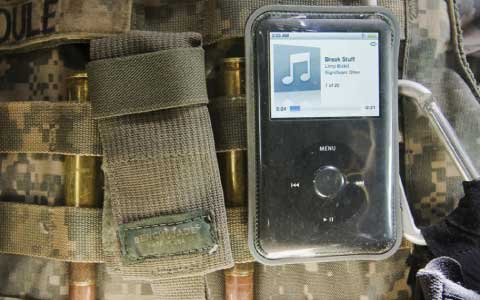
Soundtracking Iraq
‘Let the bodies hit the floor, let the bodies hit the floor,
let the bodies hit the floor, let the bodies hit the… FLOOR!’
– ‘Bodies’ by Drowning Pool
The refrain lyrics to Drowning Pool’s ‘Bodies’ seemed innocent enough in the summer of 2001. The band was emerging as one of best new hard rock/metal acts and ‘Bodies’ was surging to the top of the charts. When the band toured on Ozzfest (a heavy metal festival) that summer, the song was a mosh-pit anthem as thousands of fans literally ‘hit the floor’. The song’s continued success propelled the band to the main stage of this two-stage event by the end of tour and their future was looking bright. That is, until September 11.
Then, ‘Bodies’ became toxic. No DJ or radio station in the US would play the song. Its lyrics had taken on a completely new meaning as images of bodies falling from the World Trade Center Towers were broadcast internationally. ‘Bodies’ was erased from radio and MTV playlists, and the band fell from mainstream popularity. ‘Hitting the floor’ now had a different significance.
‘Bodies’, however, resurfaced and the lyrics gained a new meaning in yet another context. As US forces invaded Afghanistan in late 2001 and Iraq in 2003, the song became an anthem for some American soldiers as they engaged in combat. When ground forces rolled into Iraq, many US soldiers had ‘Bodies’ pumping in their tanks, Strykers, or iPod earbuds. The song was part of a new war soundtrack, one filled primarily with metal and rap.
This scenario might, literally, sound gruesome: American GIs mindlessly mowing down Iraqis, numbed on the songs of Drowning Pool, Metallica, Slayer, Tupac, and 50 Cent. But this was my starting point at the beginning of 2004 when I began research on the relationship between music and American soldiers in Iraq. I wanted to know what soldiers were experiencing in this music. How were the words and sounds influencing them during combat? How did listening to this music affect them?
Sound Targets
After engaging this and related topics about music and war for five years, I published Sound Targets: American Soldiers and Music in the Iraq War in May 2009. I learned a lot about how music operates in the lives of American soldiers while deployed. I learned that, in fact, the scenario was not as I originally thought. While for some, the music just pumped them up and kept them in a heightened state of awareness during long missions, for others it helped them ‘become inhuman’, ‘step outside of themselves’, or allowed them to ‘become a monster’. There was something deeper going on here, some degree of psychological transformation, and the music was an important catalyst.
And surprisingly, the music stopped when there was fighting – so much for the popularised notion that combat was nothing more than a video game for American troops who could now add their own war soundtracks. All the soldiers I interviewed said that even if the song continued to play in their headphones or vehicles, when the fighting broke out, it was like the music shut off.
As I reflect on what this research, the soldiers and their music, one of the things that immediately strikes me is how much the US military represents another, independent, culture. It is easy to think that, because these men and women are Westerners listening to the music of popular culture, we already have a degree of understanding concerning the larger contexts that surround and influence them and their musical practices. However, given the difficulties that many soldiers have returning to civilian life – there are numerous organisations devoted solely to this purpose – it can be problematic to regard civilian and military cultures as one.
Mortaitaville
A perfect musical example of this is ‘Mortaritaville’, a parody of Jimmy Buffett’s ‘Margaritaville’. This song was recorded by two soldiers, Sergeants Nick Brown and J.R. Schultz, in Baghdad and was circulated primarily among soldiers. (Upon returning to the US, they released a complete album of songs they wrote in Iraq.) When I first heard the song, I imagined it offended just about everyone. It made disparaging remarks about the Iraqis – ‘Salam alaikum. / Think I’m going to choke him / if he says one more word I can’t understand. / He thinks it’s funny. / I think he’s talking about me. / Yeah, at least I don’t wipe my ass in my hand’ – but also took shots at the country’s leadership, ‘Wasting away again in Baghdad. / Searching for my plane ticket home / Some people say that Saddam Hussein is to blame, But we know, it’s all Bush’s fault.’
As I probed further, I found that ‘Mortaritaville’ was not only part of a tradition of the dark barracks humour that extended back through numerous wars. One soldier mentioned that members of his unit gathered before going to Iraq to have a, ‘We’re All Going to Die’ party, and he ironically included songs like Louis Armstrong’s ‘What a Wonderful World’ and John Lennon’s ‘Give Peace a Chance’ on his iPod playlist during deployment. After talking to soldiers about this type of humour, it appears to be much more of a coping mechanism that pokes fun at their surroundings and aspects of military life than an expression of genuine attitudes.
I came to understand that ‘Mortaritaville’ was not so much about racist attitudes of American soldiers towards the Iraqis or even anger at Bush, Cheney and Rumsfeld. Like most military parody songs, the song ultimately makes fun of itself. The final refrain: ‘Wasting away again in Baghdad. / “One weekend, a month,” – yeah, my ass. / I’d like to kick my recruiter straight square in the teeth, / but I know, it’s my own damn fault.’ Seeing the song through this lens provided a different way to understand it; I came to appreciate the military as having its own set of cultural practices and meanings.
But let’s not overlook what is making all of this possible. The important factor underlying everything I have discussed so far is that audio technology is now far more pervasive and much more mobile. The reason that ‘Bodies’ can pump through a vehicle or that soldiers can record songs, even albums, within the context of the combat theatre is the recent advances in audio technology. Recording music at a camp or base was practically unthinkable in Operation Desert Storm (1991), and while some soldiers had portable tape players to help inspire them for combat, one Desert Storm veteran told me, ‘sure wish we had iPods then.’ The recent advances in audio technology are shaping soldiers’ relationships with music on and off the battlefield in unprecedented ways.
Interrogation
Another sonic aspect of the Iraq War that has caught the attention of popular culture is the use of music and sound in interrogation. In May 2003, Adam Piore reported for Newsweek magazine that US interrogators played metal and American children’s songs to break the will of uncooperative captives. Piore claimed that if prisoners refused to answer questions, they were often exposed to repeated metal or children’s songs for prolonged periods. Interestingly, according to Piore, ‘Bodies’ appeared on a list of songs chosen for interrogation.
I was fortunate to speak with a soldier who used music in interrogation and he said that the intention was, ‘to get on these people’s nerves so that they will break down their resistance. You just want to find some way to put a wedge between that resistance. And once you chip away a little bit of it, it starts crumbling, and so music is just a way of doing that.’ It was the art of sonic antagonisation, and he even had a tape of babies crying that he would occasionally use. Reports of this interrogation technique spread like wildfire, with some responses jokingly dismissing the practice and others condemning it as torture.
I must admit that I am somewhat surprised by the attention that issues like sound and music in interrogation and as an inspiration for combat have received. There have been countless television, radio, newspaper and magazine pieces on these topics, all ‘breaking the story’ of these new uses of music. In reality, though, not much of what is happening in Iraq is new.
Music has been used to inspire soldiers throughout history. One can go back to Plato, who thought that certain musical scales could incite aggressive behavior, and pipers have long led armies to the battlefront. Music and sound in interrogation has numerous precedents as well. This technique was almost certainly used by Nazi interrogators, but for sure in August of 1971 when twelve suspected IRA terrorists were arrested by British agents and subjected to a prolonged and continuous ‘noise or hiss’ pending interrogation. The idea here is exactly the same: sound irritates or frustrates detainees to the point that they will answer questions during interrogation.
While some reports portray this as a new practice, there are even cinematic precedents for this technique before 1971. In a scene from Alfred Hitchcock’s 1940 film, Foreign Correspondent, Nazi spies attempt to obtain secret information about a peace treaty from a character named Van Meer. Van Meer is drugged and placed in a bed with bright lights shining directly upon him. A recording of big band jazz music is played repeatedly as one of the spies prevents Van Meer from putting his hands over his ears. Another cinematic example is the James Cagney comedy One, Two, Three (1961). In one scene, East German officials interrogate a character, Otto, who has been accused of being an American spy. The scene implies that they have been playing Brian Hyland’s 1960 hit ‘Itsy Bisty Teeny Weeny Yellow Polka-Dot Bikini’ for hours in an effort to break Otto’s will. Although Otto is a dedicated Communist, the repetitive music drives him to sign a confession.
Obviously, both of these uses of music have clear precedents, fictional or real, so I’m curious, why now? Why do we suddenly care that music is being used in interrogation? I’m not sure I know the answer. Perhaps it is due to the considerable amount of political controversy surrounding the Iraq War and these uses of music demonstrate the continuing barbarity of the war – exposing these practices is one way to protest and illustrate how wrong the war is.
Part of the battlefield
Is it the perceived hypocrisy of a world power like the US – who supposedly holds herself to the highest standards of ethical treatment of others – using music in such unethical ways? Or maybe it is the fact that music is no longer the sound of song telling us about war and protesting it: music is now part of the sounds emanating from the battlefield itself, along with the sound of guns, grenades and bombs. And this makes us uncomfortable because we like to hold on to the romanticised notion that music is something that delights our senses; it doesn’t inflict harm on others.
The questions and possible answers could go on and on, but one thing is for sure, music has become a major part of the war story. Heavy metal and rap artists are being interviewed about how they feel about their music on soldiers’ soundtracks to combat, and groups like the human rights organisation Reprieve have released a ‘torture playlist’ and launched an initiative called ‘zero dB’ to protest the use of music in interrogation. To even the score a little, they suggest a compilation disc titled, Now that’s what I call Torture, President Bush’s selection of eight songs he would take to a Desert Island, blasted at him for all eternity.
Every picture – even my own – is painted with the possible tint of being a platform for expressing the political leanings of its author. If one wanted to lionise or demonise American soldiers, one could. It would have been very easy to depict and analyse soldiers listening to metal and rap during combat as a group of dehumanised young men playing a game on their Xbox, blaming American society and the media for their continuous glorification of violence. But this ignores a lot, particularly what one discovers through talking to the soldiers about their experiences.
‘Mortaritaville’ could be treated similarly. Should one want to focus on the controversial aspects of the lyrics, like ‘We don’t know the reason, / we’re missing deer season. / Nothing to show but a turban to two’, one could have done so. Then, it is easy to reach the conclusion that the song signifies American soldiers’ true attitudes about the Iraqis as animals who are hunted as trophy prizes. This is quite a different story from what the author of the lyrics, Sergeant J.R. Schultz, says about the lyrics, ‘It isn’t meant as an attack on their [the Iraqis] character. I happen to have worked daily with the Iraqi National Guard and came to have great respect for several of the soldiers, including the interpreters who worked with our unit.’
Further, if people want to portray Army interrogators as music torturers, they can. Or, one could argue the other side, pointing to the instances where useful information was obtained under ‘harsh interrogation’, and that music in interrogation has only qualified as torture in a few isolated situations. Thus, those calling it torture are labeling everyone who has used this technique as a war criminal without understanding the degrees to which the technique has been used. Moreover, this form of interrogation has rarely, if ever, been employed after 2006–7, and the music that may be presently played in detainee camps prevents detainees from communicating to each other from their individual cells – the military has discovered that detainee camps were fast becoming fertile recruiting grounds for militant movements like al-Qaeda and the loud music creates a sonic barrier preventing communication. Or, this is all a bunch of bullshit that thinly veils a defense of torture.
Music as political battleground
The varied uses of music in the Iraq War have become yet another place where political battles are fought. It is easy to argue one side and ignore or interpret the other to fulfill a preconceived position. I have found that within many of these debates on music and war, the nuances of the discussion are sacrificed for advancing a position either for or against the war. While there is nothing wrong with this, it does have the potential to obscure one’s ability to think critically about an issue. The fact is, pursuing research on a war that is still being fought is challenging because much of the information we have access to is partial and skewed.
It is difficult to keep a level head about this material, to approach it from a critical perspective, and to engage the sometimes opposed perspectives that are expressed because people are being hurt and dying. And most of us hate this idea. Which is not to say that we shouldn’t engage a topic like the Iraq War, but a little more understanding of these limitations, complexities, and uncertainties would surely help.
As I sat on the New York City subway thinking about what I have taken away from my work on music and the Iraq War, the answer seemed to be right in front of me. When I looked up, I saw an advertisement called ‘Train of Thought’, which included the following quote from Henri Poincaré, ‘To doubt everything or to believe everything are two equally convenient solutions, both dispense with the need for thought.’ Regardless of what we may doubt or believe, the roles of music in this war call us to think anew about the art form of sound, and sound humanity.
Jonathan Pieslak’s interviews with military personnel can be heard at soundtargets.com; Further information on the recordings of Sergeants Nick Brown and J.R. Schultz can be found at iraq-songs.com; Zero dB is a campaign by Reprieve and the Musicians’ Union, which aims to end the practice of music torture (repreive.org.uk / zerodb.org).
Published on 1 October 2009















